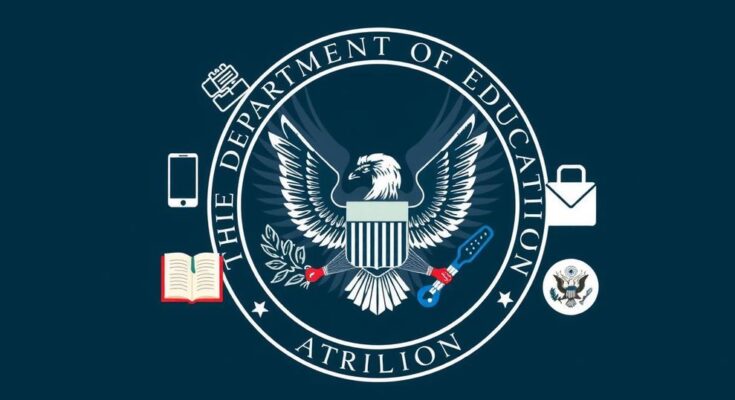President-elect Donald Trump’s goal to dismantle the Department of Education is hindered by political complexities and varying voter support. Despite attempts to push this agenda forward, experts suggest significant challenges loom—especially as recent voter decisions indicate caution around educational funding and school choice initiatives. Trump’s promise could encounter strong resistance and a reevaluation of priorities among Republicans, particularly regarding public school support.
As President-elect Donald Trump gears up for his administration, he reignites a long-held ambition among many Republicans: the dismantling of the Department of Education. In a vibrant September 2023 campaign video, Trump voiced his intent to shutter the agency, citing its bloated budget and the alleged hostility of its staff toward children. He declared, “One thing I’ll be doing very early in the administration is closing up the Department of Education in Washington, D.C., and sending all education and education work it needs back to the states.” This objective is not a mere whim; it’s been a rallying point for conservatives since the department’s creation in 1980. Even though Trump publicly disavowed Project 2025 — a strategic blueprint for his administration — its influence looms large among his advisers. Yet, experts suggest that realizing this vision will be fraught with significant challenges. Joshua Cowen, an education policy professor at Michigan State University, emphasizes the complexity of this endeavor, noting that while the political climate might seem favorable, the actual closure of the Department of Education poses serious difficulties. “It’s more realistic than ever, but I don’t want to overstate the possibility. It’s going to be hard,” he remarked. A unified effort from Congress would require a filibuster-proof majority, a barrier that remains daunting even with Republican control. Cowen also indicated that some Republican legislators might hesitate to support such a drastic measure, recognizing that the agency’s oversight includes initiatives that many voters appreciate. Instead, it’s likely that Republicans will pursue funding cuts to programs focused on equity, inclusion, and those aiding migrant communities. Meanwhile, Columbia University’s Aaron Pallas outlined the potential threat to Title I funding, which supports low-income students, as part of a broader strategy shifting educational responsibilities back to state and local agencies. In a promising twist, Trump aims to empower parents with the option to choose alternative schooling for their children. However, recent state ballot outcomes suggest that not everyone shares his enthusiasm. Voters in Kentucky, Colorado, and Nebraska rejected proposals that aimed to funnel money away from public education, indicating a potential disconnect between GOP leaders and their constituencies. The skepticism towards school choice schemes, particularly among rural Republicans lacking private school options, adds another layer of complexity. Cowen aptly pointed out, “I know that you don’t get reelected by voting against the biggest employer in your district,” underscoring the delicate balance legislators must strike between party loyalty and constituent needs.
The article centers on President-elect Donald Trump’s commitment to dismantling the Department of Education, a goal voiced during his campaign. Prominent Republicans have long sought to abolish the department since its establishment in 1980. Despite Republican control of Congress and the presidency, expert opinions suggest that significant barriers exist, including political resistance and the potential backlash from constituents who benefit from current educational funding and initiatives.
In summary, Trump’s ambition to dismantle the Department of Education reflects longstanding Republican aspirations but faces considerable obstacles. Experts recognize that while the political landscape seems conducive for such actions, grassroots support and the realities of educational funding complicate what might seem straightforward. The push for school choice and the potential cuts to federal funding signal a contentious road ahead as education remains a critical and emotional topic for many Americans.
Original Source: www.cbsnews.com



